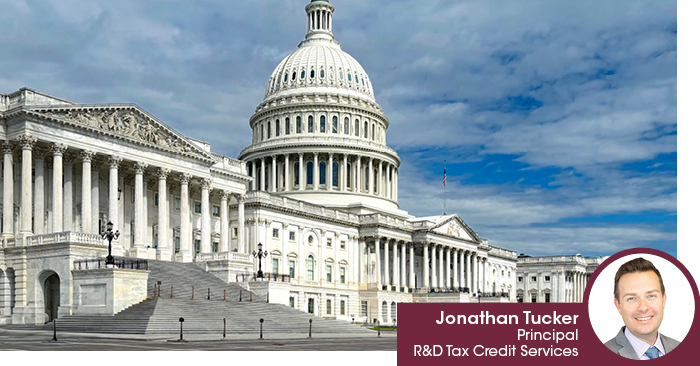Follow KBKG on Social Media
By Jonathan Tucker | Principal, Research & Development Tax Credits
On April 10, 2025, the U.S. House of Representatives approved the final version of the Fiscal Year (FY) 2025 budget resolution (H. Con. Res. 14) by a razor-thin margin of 216 to 214, which will incorporate amendments passed by the Senate on April 5. While the resolution does not change tax law itself, it lays the groundwork for potentially significant tax cuts and spending reductions that will directly impact small businesses and their advisors.
The budget resolution functions as a blueprint for Congress’s tax and spending priorities. With this vote, lawmakers have opened the door for follow-up reconciliation legislation, which can be passed with a simple Senate majority (verses 60 votes that are normally required) and used to implement real policy changes, including updates to the tax code.
Key Takeaways:
- Potential Section 174 Fix: There is renewed momentum to restore full expensing for domestic research and experimental (R&E) costs. Since 2022, businesses have faced increased compliance burdens and cash flow strain due to the mandatory five-year amortization of R&D expenses. This resolution signals a path for reinstating immediate expensing, which many in the business and accounting communities view as critical.
- Tax Cuts: The resolution emphasizes tax policies, and reconciliation legislation could include extensions of the Tax Cuts and Jobs Acts, and expansions of other tax incentives, such as bonus depreciation, the Section 179 deduction, and qualified business income (QBI) treatment.
- Spending Restraint: Expect proposals to reduce non-defense discretionary spending, which could affect certain federal programs such as Medicaid (which the White House has given assurances it won’t be touched) and SNAP benefits.
What’s Next?
With the resolution finalized, the focus now shifts to the House Ways and Means Committee and the Senate Finance Committee, which are expected to begin drafting reconciliation bills over the coming weeks. These bills are where the actual tax code changes will take shape.
For tax professionals, this is the time to:
- Monitor legislative drafts closely for business-related provisions.
- Model potential impacts of R&D expensing changes for clients.
- Be ready for accounting method adjustments if Section 174 expensing is restored or made retroactive.
For small business owners, the prospect of lower taxes and fewer compliance burdens is welcome, but the legislative outcome remains uncertain.
Conclusion
The FY 2025 budget resolution doesn’t directly change the law, but it sets the stage for real tax relief measures that could materialize in the coming months. Stay alert for reconciliation developments, especially around R&D expensing, depreciation, and small business incentives.
KBKG and its experts specialize in navigating complex tax legislation and translating policy shifts into practical, strategic solutions. Those with questions about current tax incentives and benefits are encouraged to contact a KBKG expert today.
About the Author
Jonathan Tucker | Principal – Research & Development Tax Credits
Jonathan Tucker is based in Atlanta, GA, and has over 20 years of experience providing federal business tax advisory services, primarily in R&D tax credits, to clients in various industries including technology, manufacturing, transportation, healthcare, retail and consumer products, hospitality, media and entertainment, financial, and other professional services industries. Read More



